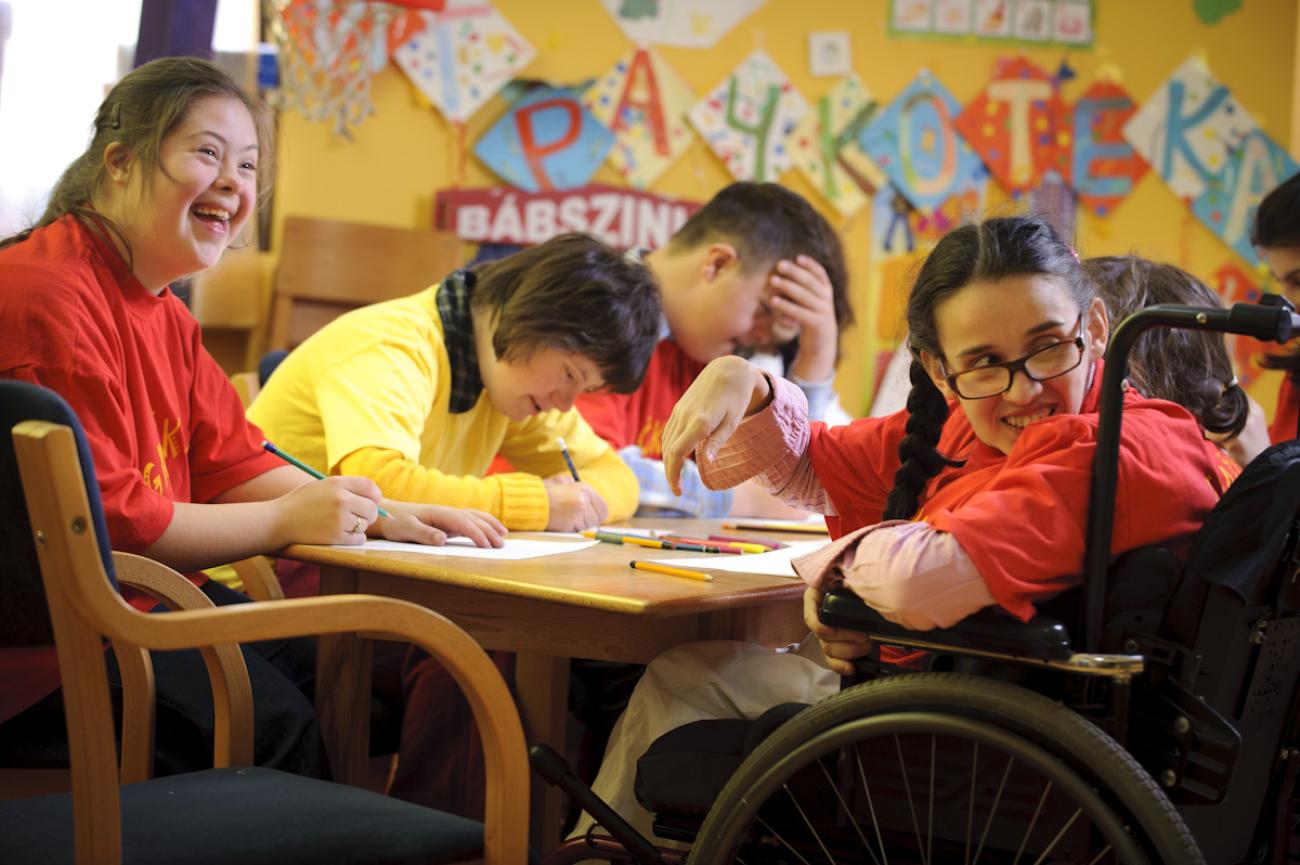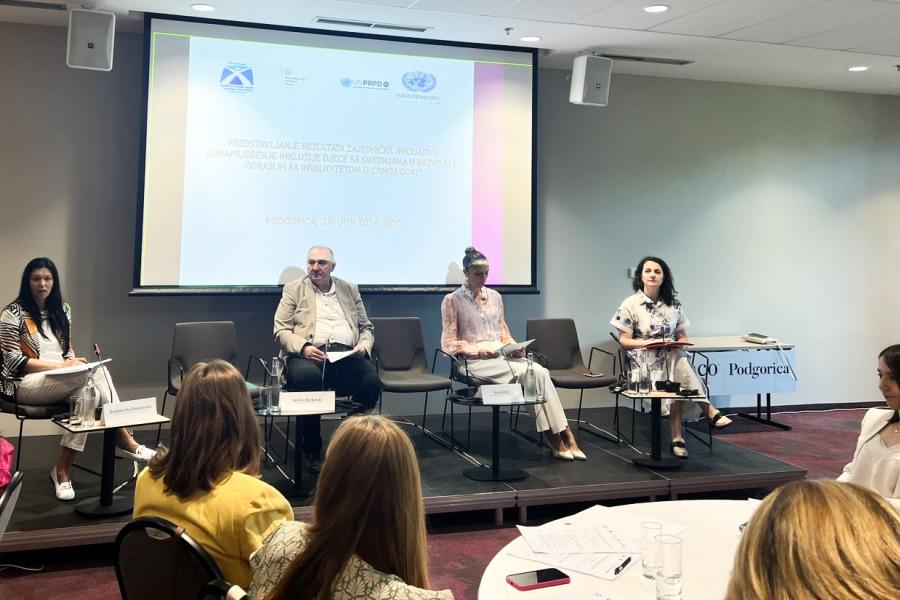Partnership for better support to children and adults with disabilities

A key success of the programme has been in ensuring meaningful participation of organizations of persons with disabilities (OPDs) in all its stages.
Podgorica, 28 June 2024
Building strong partnerships is critical for increasing institutional capacities to prevent institutionalization of persons with disabilities, and overall to make much needed progress on realizing the rights of persons with disabilities in Montenegro
This was concluded at a conference held on 28 June, in Podgorica organised by the Government, Ombudsperson’s Institution and the UN System in Montenegro, where key results of the two-year initiative ’Accelerating Disability Inclusion for Adults and Children with Disabilities in Montenegro’ were presented. The joint programme was funded by the UN Partnership for Persons with Disabilities (UNPRPD) and implemented by UNDP and UNICEF with support from the UN Human Rights Adviser, in collaboration with the Ministry of Labour and Social Welfare, the Ministry of Human and Minority Rights, the Ombudsperson and organizations of persons of disabilities (OPDs).
The representative of the Ministry of Labor and Social Welfare, Budimirka Đukanović, indicated that “the Ministry, in cooperation with the UN and the institution of the Protector, participated in the implementation of the project in the previous three years within the framework of the realization of national development priorities and Sustainable Development Goals and the realization of internationally recognized obligations of the Government in the domain of realization of human rights, social inclusion and reform agenda related to the process of accession of Montenegro to the EU”. Đukanović stated that the project was initiated as an integral part of the UN Cooperation Framework of Montenegro during 2021, in the area of promotion of the rights of persons with disabilities.
The project was implemented in 2022 and 2023, and was preceded by the initial phase, in 2021, during which representatives of the Government, the Protector, persons with disabilities and organizations of persons with disabilities (OPDs) were consulted on priority areas.

The Ombudsman Siniša Bjeković said that within this, according to numerous indicators, the most marginalized social group, there are many members of society who are additionally burdened with barriers in exercising their rights.
"In this multiple and intersectional inequality, situations quite often occur that are beyond the attention of those who make their way through life with significantly fewer obstacles in achieving factual equality in society and the state," said Bjeković with a call to business entities and an appeal for corporate social responsibility in integration of persons with disabilities. He expressed the hope that the upcoming reform of social and child protection will adopt a different approach and find suitable models of care for children with special developmental needs."
He thanked the partners from UN agencies, particularly UNICEF, with whom, as he stated, was done something that the state had forgotten or put on the back burner, "and that is to design and put into operation an independent body that will monitor the fulfilment of the state's obligations according to the UN Convention on the Rights of Persons with Disabilities".
“The UN in Montenegro will continue to provide support and advocate for equity, equality and full inclusion of persons with disabilities in Montenegro’s society in line with the country’s obligations deriving from ratification of the United Nations Convention on the Rights of Persons with Disabilities,” said Nela Krnić, UNICEF Representative ad interim, and project coordinator. She thanked to disability rights organizations, the Ombudsperson, ministries and other partners for excellent collaboration over the past two years.
Under the joint programme, 100 professionals from various sectors , were trained to prevent institutionalization, develop a community-level service model and to provide psychosocial support. The groundwork was laid for the setting up of Montenegro's first Centre for Foster Care in support of children with disabilities. Research of the needs of adults with disabilities resulted in the identification of key community support services they require and a cost analysis of three such services. Guidelines for disability-inclusive budgeting were developed, with the aim to increase resourcing for community-based services, but overall for stronger realization of the rights of persons with disabilities Sign language – that is now officially recognized – was also facilitated under the programme.
The programme supported the establishment of the first Independent Monitoring Mechanism (IMM) led by the Ombudsperson and including ten organizations of persons with disabilities (OPDs). The IMM is already overseeing the implementation of the UN Convention on the Rights of Persons with Disabilities (CRPD) in Montenegro. It conducted ten field visits during the programme, looking into inclusive education, social and child protection and the situation in Dobrota psychiatric hospital, among other things. Members raised challenges identified and have made recommendations to with relevant authorities to tackle these.
With the support of the programme, the recently re-established Directorate for the Protection of Persons with Disabilities from Discrimination, in the Ministry of Human and Minority Rights, enable the development of two-year action plan to advance on the major strategic document on the rights of persons with disabilities in Montenegro.
“A key success of the programme has been in ensuring meaningful participation of organizations of persons with disabilities (OPDs) in all its stages , from the initial situational analysis to design and implementation of the programme,” said Krnić. The UN system in Montenegro integrated an assessment of the situation of persons with disabilities in its 2024 update of the Common Country Analysis which inform UN programming Under the programme a group of OPDs also raised knowledge and skills of more than 80 UN staff enabling them to strengthen integration of disability in their programmes and operations.
“This Programme connected us. We usually do not have the opportunity to collaborate. Yes, we have collaboration among parents of children and youth with developmental disabilities, but this project provided the opportunity to work with other organizations of persons with disabilities,“ said OPD representative who participated in the programme.
Realization of the rights of children and adults with disabilities is an important aspect of the work of UN in Montenegro. It is one of the cornerstones for reaching the promise made under the Sustainable Development Goals and to advance on the UN’s Disability Inclusion Strategy. The UN will, in the upcoming period, continue its support to Montenegro to to prevent the institutionalization of children and adults with disabilities and to build more community-based services. Representatives from disability rights organizations will continue to monitor the implementation of the United Nations Convention on the Rights of Persons with Disabilities (CRPD) in Montenegro, through their collaboration with Ombudsman institution.





